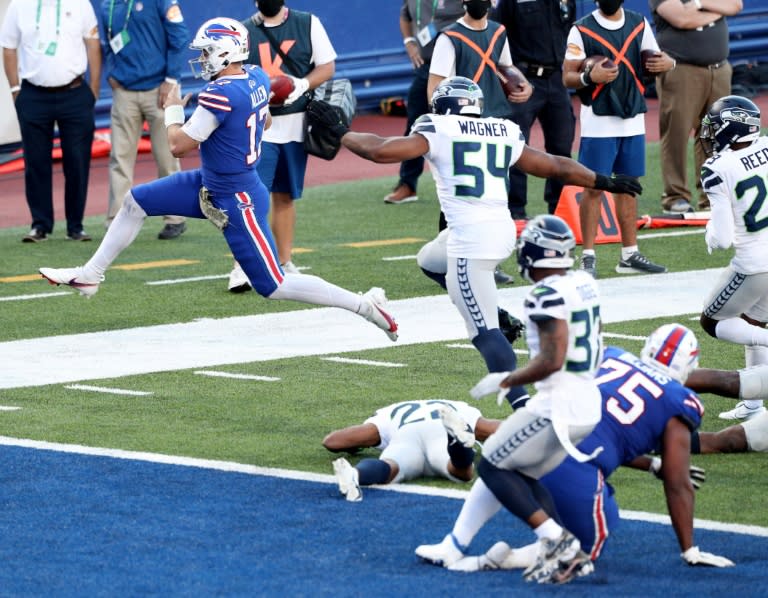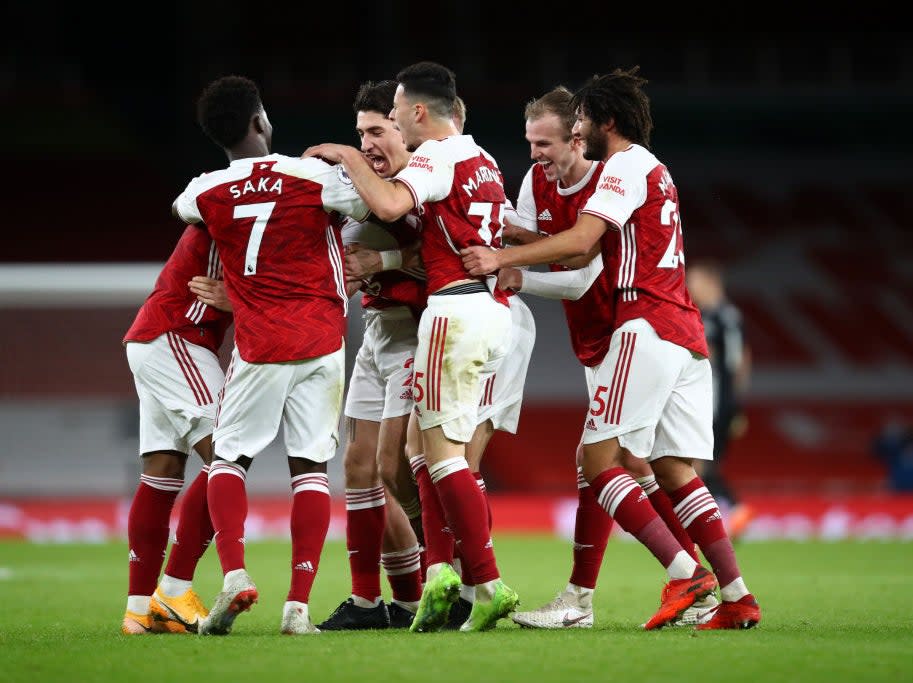Tony Gonsolin stepped off the Dodgers’ team bus Saturday wearing a T-shirt featuring “PAWS” in big, bold letters, a parody of “Jaws,” the legendary shark-attack thriller. On the T-shirt, a menacing cat lurks underwater, poised to rise from the sea and inflict terror upon unsuspecting inhabitants on the surface.
“It’s a pretty nice shirt,” Gonsolin said. “I feel like it’s aggressive. That’s what we need to do today: be aggressive.”
And so they were. The Dodgers’ second and third batters of the game, Corey Seager and Justin Turner, hit back-to-back home runs, putting the team ahead to stay in a 3-1 victory and forcing a decisive Game 7 of the National League Championship Series on Sunday.
The Atlanta Braves named Ian Anderson as their starting pitcher. The Dodgers did not announce a starter, and all that manager Dave Roberts would say was that there was “a good chance Gonsolin will take down a good bit of it.”
The Dodgers will be as aggressive as the evil cat on Gonsolin’s shirt, and as imaginative as their probabilities can dictate.
Left-handers Julio Urías and Clayton Kershaw provide options to start, if the Dodgers prefer to use Gonsolin in the middle innings. In relief, Kenley Jansen would be throwing for a third consecutive day, although he made just six pitches Saturday. Brusdar Graterol did not pitch in Game 6. He could pitch an inning late in the game — or he could pitch the first inning, as an opener.
And, of course, Kershaw was the closer the last time the Dodgers played a Game 7.
In that game, the finale of the 2018 NLCS, Walker Buehler was the starting pitcher, in his first season in the Dodgers’ starting rotation. He was followed by Urías, who already had started a postseason game at age 20.
This is where we tip our caps to the Dodgers, and to their ever-flowing pipeline of young talent.
Anderson is a rookie too, but the Braves did not plan for him to be in this position. They signed four-time All-Star Cole Hamels for that. Hamels won a World Series 12 years ago, but he is injured now.
The Dodgers did plan for Gonsolin to be here, and for Urías, and for Dustin May.
“It just speaks to the intelligence of these young guys, and understanding the value they have in whatever role we see fit,” Roberts said. “And they’re thriving, they all are.”
The safe play in baseball is to sign veterans, to give your young pitchers time to develop and protect yourself from rushing them. A rebuilding team can afford the growing pains of a young starter, but a contending team cannot.
With that in mind, consider the Dodgers’ offseason decisions to bid farewell to playoff-tested veteran pitchers Rich Hill, Kenta Maeda and Hyun-Jin Ryu. The Dodgers were not just talking up their pitching prospects for Baseball America fodder; they actually were clearing space for Gonsolin, May and Urías.
They did acquire veterans David Price and Alex Wood, but look what happened: Price opted out of the pandemic-shortened season, Wood is in the postseason bullpen, and the Dodgers traded swingman Ross Stripling. Can you imagine any other organization essentially shedding six starters? To tank, sure. But to win?
While general managers love to drop the phrase “sustainable success” into a conversation about organizational aspirations, the Dodgers are the living, breathing model of sustainable success.
Their young pitchers do not implode.
Gonsolin posted a 2.31 earned-run average this season, with May at 2.57 and Urías at 3.27. The ERA+ statistic, in which 100 represents the league average and higher is better, had all three pitchers at 130 or more — that is, at least 30% better than the league average.
Gonsolin is the oldest, at 26. The Angels have pretty much been auditioning pitchers for years now. The last time the Angels had even one starter at 26 or younger, with better than a 3.27 ERA and a 130 ERA+?
That would be Garrett Richards, in 2014. The time before that? Jered Weaver, in 2006.
Sustainable success? That would be the Dodgers’ 2016 draft. They selected catcher Will Smith in the first round, May in the third, Gonsolin in the ninth.
Mitch White, their second-round pick, could be their next great young arm. Infielder Gavin Lux, the first of the Dodgers’ three first-round picks, could become their next second baseman.
And two other arms drafted that year were traded for midseason reinforcements: Devin Smeltzer (fifth round) for Brian Dozier, and Dean Kremer (14th round) in the package for Manny Machado. Both Smeltzer and Kremer have made the majors.
Or consider the Dodgers’ 2016 roster for their Class-A affiliate, the Great Lakes Loons. A remarkable seven pitchers from that roster have made the majors.
Buehler is one, and he won Saturday. Gonsolin is another, and he could put the Dodgers into the World Series on Sunday. Paws up, and cue the ominous music.
Shaikin reported from Los Angeles.
This story originally appeared in Los Angeles Times.








